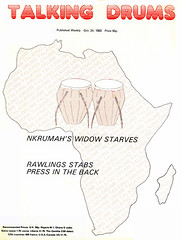Francophone Summit: Crack In The Wall
Ben Mensah
The French also emphasised their paternalistic posture in the Franchop hone community beyond all doubts when their military intervention in the conflict in Chad which had been condemned and commended in various circles was not an issue for discussion by the thirty eight heads of state whose time at the summit was taken up mostly by Chad.
Even more spectacular was President Mitterrand's announcement in his opening address that French aid to the developing countries had risen from 0.3 per cent of gross national product in 1981 to 0.5 per cent this year and that France would reach the United Nations target of 0.7 per cent of GNP next year.
This revelation links France to the Scandinavian countries as the only ones in the developed world who have fulfilled the UN expectation of 0.7 per cent of GNP aid commitment to the developing countries.
What makes the French contribution unique is the fact that the French economy has been under severe strain and has experienced a series of devaluation of the currency in recent months.
This factor and the choice of Vittel by President Mitterrand to make the revelation or to emphasise it to the international community gives a clue to the sort of relationship France aspires to continue with her former African colonies since her policy of assimilation in the first half of the century. A notable presence at the sur for the first time in over twenty ye was President Ahmed Sekou Toure Guinea who had rejected a role in President de Gaulle's vision of Francophone Community.
And as expected, President Mitterand reciprocated this reconciliatory gesture from Guinea by according President Sekou Toure the kind of warm reception reserved for suc 'vieux' as Houphouet Boigny of the Ivory Coast and ex-President Senghor of Senegal. He was also encouraged to act as the spokesman of a group of moderates who actually attempted to express the summit's gratitude to France for sending troops to Chad.
Hence with the near consensus of the summit over the Chad conflict, silence over French military intervention in Chad, return of prodig President Sekou Toure into the Francophone community, which was cheered by the news of increase in French aid to the developing world, the stage was set for France to. continue to enjoy the unstinted support of her former colonies in the international arena.
But as was metaphorically put by Togolese President Gnassimgbe Eyadema in reference to the Chad conflict "When a wall has no crack, a lizard cannot enter through it in the evening. The wall at the moment has a crack" Today there is a crack in the French community too. President Thomas Sankara of the Upper Volta does not only owe his allegiance to Colonel Gaddafy of Libya. He also will not easily get over his suspicion that France was responsible for his abrupt removal as Prime Minister last May by deposed President Major Jean-Baptiste Ouedrago.
The 34 year old Captain Sankara appeared at the summit in fatigues not only to show his regret that he only, among the Heads of delegations, was met at the airport not by a Minister but by President Mitterand's adviser on African Affairs, Guy Penne. His subsequent boycott of the opening banquet at the Elysee for the Heads of State, hosted by President Mitterand marred an evening of cordiality but the significance of his action was more relevant to the crack in the wall surrounding the Francophone Community.
Another leader whose presence aroused considerable interest was Colonel Denis Sassou Nguesso, President of the Congo who was reported to have visited Colonel Gaddafy in Libya more than once just before the Vittel summit.
He is known to support Goukhounni Weddeye in the Chad conflict and also joined the radicals in rejecting the summit's appreciation of France's military intervention in Chad.
In the past when President Sekou Toure disagreed with Paris, he simply stayed away from the Francophone summits.
This time Presidents of former French colonies who disagree with Paris will not stay away from such meetings. Instead they will make their presence felt, refuse to be impressed by such news as increase in French aid to the developing nations and openly disagree or criticise the position of their former colonial master on any international issue.
This development in itself is not a bad idea but when the Presidents involved do so by virtue of their allegiance to Colonel Gaddafy of Libya' then they have only succeeded in substituting a former colonial master with a new one who unfortunately lacks any of the trappings of the civilization and sophistication that were associated with the known colonialists.
It has been said that Libya is destabilising West Africa while Colonel Gaddafy is seeking to experiment his Green Book ideas in the sub-region.
Already Ghana under Flt-Lt Rawlings and Upper Volta under Captain Sankara have People's Revolution where managers, professionals, business men, church leaders etc. are being branded anti-people and hounded. Only Colonel Gaddafy knows which country is next to fall behind his Green Book ideology.
Now that the united front of the Francophone community is also being split by Libya into 'radical' and moderate' camps as was in evidence in Vittel, perhaps all the complaints about Colonel Gaddafy's intentions and activities in the sub-region will be taken seriously by the international community and a definitive effort made to stop him.
